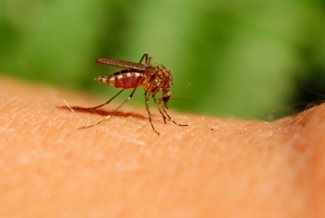The Bugs of Summer: Ticks, Skeeters, and When to Worry
Oh, if only all insects could be butterflies and lightning bugs! Alas, on long summer days, pesky ticks and mosquitoes round out the mix.
Are their bites just nuisances, bringing about rashes, maybe a relentless itch? What about notorious bug-borne illnesses, like Lyme and West Nile? For the facts, we spoke with infectious diseases specialist Dr. Ghinwa Dumyati.

Health Matters: Do local insects harbor serious disease risks?
Dumyati: That’s a tricky question, because it depends on the bug. They could. But there’s a big gap between what’s possible and what’s probable.
In Upstate New York, we have seen over the past several years an increase in locally acquired Lyme disease due to an increase in infected deer ticks. Ticks can transmit other bacteria such as Anaplasmosis. Still, there are simple, important steps you should take to protect yourself.
Health Matters: Heartening news. Let’s start with Lyme.
Dumyati: Lyme disease can bring about a host of aches, pains, rashes, even neurological troubles in the gravest cases. Infected deer ticks, which transmit Lyme disease, can be found throughout New York State. Anaplasmosis causes fever, muscle aches, weakness, and headache. Unlike Lyme disease, it does not cause a rash.
We’re smack in the middle of tick season. They become active when the weather stays above freezing, usually from April through November. The time of greatest concern is in late spring and early summer; these nymphal-stage ticks are small as a sesame seed, and hard to see.
Some important things to note: Not all ticks are infected with Lyme. And, for a Lyme-infected tick to possibly pass along the bacteria, it needs to feed for at least 36 hours. The trouble is that many don’t feel the tick’s bite, so you need to vigilant about stripping down, showering, and checking yourself after you’ve spent time outdoors—especially in areas with higher grass or leaf litter. Simple precautions help, too, like applying insect repellant (look for stuff with more than 20 percent DEET), sticking to the middle of trails, tucking your pants into your socks, and cycling your dirty clothes into the dryer for an hour on high-heat (to kill stowaways). Be sure to check over your dog, too, if he or she joined in on your hike.
Health Matters: What if you find a tick on you?
Dumyati: Don’t panic. Grab a pair of fine tweezers and take hold of the insect’s mouth-area, then lift. Don’t smush the bug’s body. If the bug is engorged, or if you’re worried about incomplete removal, call your doctor. Most (but not all) infected people see a bull’s eye patch emanating from the bite site. Other early symptoms include chills, fever, headache, or a stiff neck. New York State’s health department offers a Be Tick Free Guide, and an info sheet on Lyme Disease and Other Diseases Carried by Ticks.
Health Matters: Got it. Now shifting gears: What about West Nile?
Dumyati: It can be hard to predict our region’s risk overall for West Nile, but in recent years, it’s been minimal in our area compared to other regions of the US. Even so, we’ll have to wait and see; things tend to pick up around late August.
Health Matters: How would you know if you were infected?
Dumyati: You might not. Many people don’t have symptoms. Mild cases might give rise to a fever, headache, or skin rash, and most “victims” recover completely. It poses a bigger threat to immune-compromised and elderly persons; they suffer more severe disease. Extreme, rare cases might include convulsions, muscle weakness, paralysis, and even dangerous infection of the brain (meningitis/encephalitis). Again, this is uncommon. You can learn more at mosquito-transmitted sickness on the state health department’s website, here. The same precautions I mentioned earlier—bug spray, etc.—are useful. Make sure window and door screens are free of rips and tears, too. Rid your yard of stagnant water, too; it’s a breeding ground for mosquitoes. Change out waters in birdbaths. Watch for empty containers that collect rainwater, clogged gutters, and swamp-like swimming pools.
Health Matters: Should we be concerned about malaria?
Dumyati: For now, there is no cause to be concerned in New York. The same control and prevention of West Nile disease will apply, such as controlling the mosquito population around your house and using mosquito repellents. It is important for people traveling to malaria-endemic areas outside the US to use mosquito repellents and ask their medical provider if taking medications to prevent malaria is warranted.
 Ghinwa Dumyati, M.D., professor of Medicine at URMC, brings expertise tracking how bacteria and viruses spread both in hospitals and the healthy community. Her work with the New York State Emerging Infections Program, for instance, helps the CDC keep tabs on national public health threats, like flu, COVID-19, MRSA, and C. diff. Dumyati directs communicable disease surveillance and prevention at URMC’s Center for Community Health and Prevention.
Ghinwa Dumyati, M.D., professor of Medicine at URMC, brings expertise tracking how bacteria and viruses spread both in hospitals and the healthy community. Her work with the New York State Emerging Infections Program, for instance, helps the CDC keep tabs on national public health threats, like flu, COVID-19, MRSA, and C. diff. Dumyati directs communicable disease surveillance and prevention at URMC’s Center for Community Health and Prevention.
Updated June 2023

